Ever wonder why the biggest market for pick-up trucks (that’s us, the U.S.) has so few trucks available?
Yes, yes, there are the big ones – mostly made by the Big Three. But how come the others – smaller brands, smaller trucks – have been so reticent about cashing in on this most lucrative (highest profit margin per vehicle) segment?
Could it be the “chicken tax”?
Never heard of it?
It’s the tax – the tariff – that makes it much more expensive to bring a truck to market in the U.S. that was not made in the U.S.
It was signed into law back in 1963 by Lyndon Johnson as a retaliatory measure directed at France and West Germany, which had imposed tariffs of their own on the importation of U.S. chicken. Hence the name. The measure hit back with tariffs on potato starch, brandy and light trucks imported to the United States, with the object of making all of them more expensive to import.
How much more expensive? How about 25 percent more expensive. Which makes them less profitable to sell here.
Which explains why – in general – they’re not sold here.
Including, ironically, some “domestic” models like the Ford Ranger. Which is a Ford, but no longer made in the USA – and so subject to the tariff. So Ford sells the Ranger pretty much everywhere except here.
But mostly, the tariff affects foreign-brand (as well as foreign-made) medium and compact-sized models like the Toyota HiLux, which is smaller than the Tundra Toyota sells here (and which is made here; now you know why) and also the Mitsubishi Triton, the Mazda B-Series and the new VW Amarok.
Those are just a few of the models most Americans have never heard of – let alone ever test driven.
And it’s not just that American buyers are denied these choices. The cloistered market is less competitive as a result – which means, less innovative. It’s no accident that none of the “majors” – especially GM, Ford and Chrysler (now Fiat-Chrysler) sell a compact truck here. Why should they? There’s no competitive pressure to offer them. Despite the huge demand for these vehicles world-wide (and – formerly – here, too).
Toyota, for instance, has sold more than 16 million HiLuxes.
That’s a lot of trucks.
A lot of potential profit, too.
But when Uncle takes the profit out of the sale, the incentive to sell tends to wilt.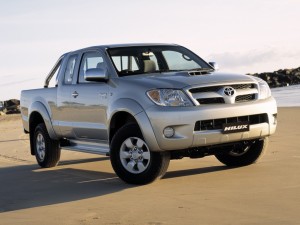
Some manufacturers have taken the radical step of moving operations here. Opening assembly lines in the United States. Which end-runs the tariff because the truck is now considered a “domestic” rather than an import – regardless of the brand on the fender.
This is the real reason why Honda built a plant in Alabama to build the Ridgeline – the company’s first U.S.-available pick-up. And why Toyota built a plant in Texas (truck central) to build the full-size Tundra. Nissan’s Titan pick-up is built in Canton, Mississippi – not Hiroshima, Japan. (Nissan was the first foreign automaker to unbox operations here – in Smyrna, TN, back in 1983 )
And so on.
If you check into it, you’ll find that all of the currently available “import” brand pick-ups are actually made in the USA.
Which is why there are so few – relatively speaking – “import” brand pick-ups available for sale in the USA.
Currently, there are just two medium-sized ones (the Nissan Frontier and the Toyota Tacoma) and two large (1500 series) models (the Nissan Titan and the Toyota Tundra).
That’s it. The smaller outfits can’t afford to build a whole new plant just to sell a new truck. Especially when they already have a plant. But it’s located outside the U.S.
Enter the tariff. Or build a second plant (here) and double their capital costs.
Models that almost certainly would receive a warm welcome – in particular, VW’s Amarok – are denied us because the economics are untenable. The automaker can invest massive sums (it takes about $2-$3 billion to build a new plant from scratch) so as to earn the “made in the USA” badge – and dodge the tariff. But the automaker now faces the prospect of amortizing its capital investment, which may take decades.
Maybe forever.
How many Amaroks would VW have to sell to make back $2-$3 billion?
Shareholders tend not to be enthusiastic about such out-on-a-limb measures.
Or, the automaker can import the vehicle – with the tariff folded into the MSRP. Which renders it more expensive than its home-built rivals and thus a harder sell.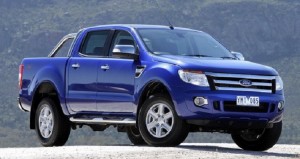
Either way, the automaker loses money on the truck – and that’s not a good way to make it.
That goes for Ford’s Ranger, too.
The popular compact – the last compact truck sold in the United States – is now made in Thailand. Which means it’s no longer economic for Ford to “import” it here, because it’s subject to the tariff.
Thus, American truck buyers get the limited choice of a full-size truck or a mid-sized truck. Either way, they pay more up front for the truck (bigger trucks costing more than smaller trucks) and down the road (bigger trucks using more fuel than smaller trucks). The latter is particularly ironic given all the braying about gas mileage emanating from Washington.
Courtesy of a “protective” tariff that was enacted – so we were told – to help Americans by keeping competitors out of the market.
In fact, the tariff helps the larger automakers at the expense of the smaller – and serves as a way to shield them from competition.The big manufacturers – this includes “foreign” ones like Toyota and Nissan – are generally the only ones that can afford to spend billions to build new plants here and thus are the only ones that do.
Not surprisingly, they – along with Detroit’s Big Three – want to protect their investment.
By denying U.S.consumers the choices they would otherwise have available.
Imagine what the market for small cars would be if a similar tariff existed on not-made-here small cars from Japan and elsewhere. Do you suppose there would more – or fewer choices – available? Would the quality and desirability of the choices available be higher – or lower?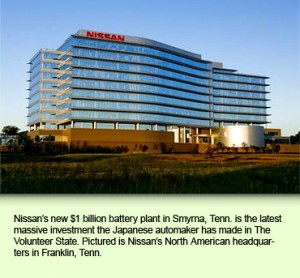
What if Apple Computers’ Chinese-made Macs were slapped with a 25 percent tariff? Would that help American consumers? Make PCs more or less expensive?
It does not – as the saying goes – take a rocket scientist.
The good news is the “chicken tax” may finally be on its way out. Part of the Trans-Pacific Partnership (TPP) trade deal that’s winding its way through Congress would roll back the tariff over a period of years and eventually, eliminate it.
TPP itself is a typical product of the Beltway sausage-making process – and god only knows what else is in the thing. But putting the chicken tax on the chopping block is hard to argue against. It’ll mean more options, truck-wise, and lower costs both to buy and drive ’em.
If only it hadn’t taken 50-plus years to do it.
If you value independent media, please support independent media. We depend on you to keep the wheels turning!
Our donate button is here.
If you prefer to avoid PayPal, our mailing address is:
EPautos
721 Hummingbird Lane SE
Copper Hill, VA 24079
PS: EPautos stickers are free to those who sign up for a $5 or more monthly recurring donation to support EPautos, or for a one-time donation of $10 or more. (Please be sure to tell us you want a sticker – and also, provide an address, so we know where to mail the thing!)




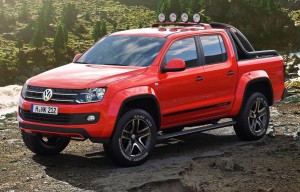






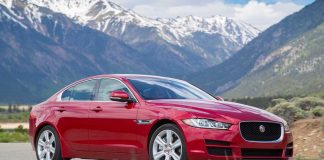
Mazda Post-Partnership with Ford:
Mazda Motor Corp. raised more than US$1.9 billion in a record stock offering sale to replenish capital as it suffered its biggest annual loss in 11 years. $770 million of the proceeds was used to build an auto plant in Mexico which began production in Jan 2014. This Mexican plant was built jointly with Mazda’s largest shareholder Sumitomo Corp.
12/25/2014 Mazda News:
Mazda’s Mexico Plant Produces 100,000th Vehicle
http://www2.mazda.com/en/publicity/release/2014/201412/141225b.html
HIROSHIMA, Japan—Mazda Motor Corporation has announced that accumulated production at Mazda de Mexico Vehicle Operation (MMVO) has reached 100,000 units.
The 100,000th car to come off the production line was a Mazda2 (known as Mazda Demio in Japan) bound for Europe.
Mexico’s free-trade agreements with countries around the world are the biggest influence on all the auto industry investment there — far more so than Mexico’s lower-cost labor.
You posters who remember the Japanese–made compact pickups of decades past might wonder how they got past the chicken tax. The reason is that the tax effectively was not enforced for some years on trucks from Asia (to simplify a long, complicated story) as long as some token attempt of assembly occurred here. Remember, the real target of the 25% tariff had been the pickup version of the VW Kombi (“Microbus”) and any other European pickup, not really those from elsewhere. To comply with “assembly”, Isuzu allegedly just tightened a few bolts on its pickups after they made US ports, for instance. But Toyota was actually assembling the whole beds for its pickups here even in the late 1970s at an operation in California.
The feds decided to tighten the rules around 1990 and apply the tariffs to two–door (but not four–door) SUVs, which drove the imported pickups off the US market. This led to Mazda making the deal with Ford to sell a rebadged US–made Ford Ranger as a Mazda B-series here instead of the Japanese–made model. (I work for Mazda at a low level and speak only for myself, not the company.) Toyota later imported its original larger-sized pickup, the T100, to test the waters and ate the entire 25% tariff to avoid pricing that vehicle out of the US market, meaning that every one sold here was sold at a loss right off the bat. But that led directly to its replacement, the US–built Tundra, which sells well.
The Ford Ranger sold in Asia and Australia is in fact a nearly full-sized truck, which is the reason that truck did not replace the US–built truck of that name. When the latter went out of production in late 2011 as a 2012 model, it had long been the last remaining actual compact pickup in the US market. Ford had announced plans to close the Minnesota plant that made it a few years before, but it was selling so well that the end was repeatedly postponed. Ford was selling 50,000 units up to the last MY2012 model without advertising the Ranger! There is a demand for a smaller pickup that no one is meeting.
Mazda sells a pickup, the BT-50, that is based on the Asian Ford Ranger platform. In other words, the Ford Ranger and Mazda BT-50 share a platform. Check out this truck using a search engine, as it’s sold in Australia. Again, though, it is nearly a full-sized truck.
Rumors say the BT-50 will shortly be sold in Mexico, but the tariff would still apply if brought here. Two strikes. What will become of this pickup is a good question. Not only have Ford and Mazda essentially parted ways, but Mazda announced in 2012 its plans to phase out production of “commercial vehicles” in favor of fuel-efficient cars as the truck and van lines come to the end of their scheduled production—meaning as they would normally have been due for redesign. The Bongo van sold overseas will eventually be dropped from the line, for example. Where does that leave the BT-50 down the road?
Because of NAFTA, though, any pickups built in Mexico would be exempt from the chicken tax. Just speaking for myself, I’d love to see Mazda build a compact pickup based on its fuel-efficient SKYACTIV architecture at the big new Mexico plant. My hunch is that the first company to bring a pickup capable of a real 40 mpg to the US market would have a huge winner—and we already know that not everyone wants a larger pickup anyway. But we’ll see that when we see a new rotary pickup, I guess…
Guess that would apply to the erstwhile Rabbit Pickup also.
Because of the chicken tax Ford imports cargo vans as passenger vans, then removes the glass panels replacing them with steel and then removes the seats. Now it’s a cargo van not subject to the tax. The story I heard is they didn’t even reuse these temporary parts but threw them away.
Wouldn’t you like to be a ‘prepper’ too?
http://www.mauldineconomics.com/the-10th-man/it-could-never-happen-here
Just saw this.
The clovers are determined to eliminate every last vestige of freedom.
http://www.foxnews.com/politics/2015/07/03/oregon-launches-program-to-tax-drivers-by-mile/
They’re thinking of doing this in Oz as well Bevin. However, they’d have to remove fuel excise because that’s what’s supposed to pay for roads, but much of it is siphoned off for other, less scrupulous, projects.
It won’t bother me though, as none of my stuff is registered anymore so they can go jump.. 🙂
If only they’d double the tariff and scrap the TPP.
Hmmmm, small foreign as well as small American pickups used to be routinely available well into the 1980’s. I would have to blame a misreading (or even change) of the market by Big Autos rather than the State for this one.
This is certainly a good explanation about the “chicken tax”. Just seeing LBJ’s face there makes you think of him being a mob boss…. (oh wait, he had connections to the mob in Dallas……doh!). Sadly, when Ford ceased production of the U.S. version of the Ranger, they closed the plant down that was making them still. So even if they did want to come up with some new “U.S.” version of the Ranger, I would assume they would have to retool an existing plant, or build a new one. Ironically, the Tundra and Tacoma trucks built here in the U.S. are only sold in the U.S. are they not? And the Hilux is a rename for the Tacoma, or are they completely different trucks? Ford claims they won’t sell the “global Ranger” here in the U.S. because it is almost as big as an F150 and that the market here wouldn’t support it. I think they don’t want to cut into the cash cow of the F150 since that is still their volume selling vehicle. Sigh…..my 2004 Ranger will have to keep me going for a long time since I have no new option that is comparable to my Ranger. The new Government Motors..er I mean General Motors Colorado/Canyon pickups are as big as full size pickup trucks 20 years ago now. Its ridiculous. And they call them “midsize” pickups.
LBJ was openly the head of the largest organized crime ring in the world.
“LBJ was openly the head of the largest organized crime ring in the world.”
You mean the US gunvermin?
Yup. The only difference between the Mafia and the government is the flags on the buildings.
And that the Mafia provides some value for the money they extort from you.
Ever read Robert Caro’s unauthorized bio of LBJ? He always had somebody to answer to. He was so greedy and such a coward he did what he was told. Wow, imagine a US prez who’s bought and paid for.
“He always had somebody to answer to.” Even if it was only Lady Bird.
Amazingly, she was treated as a slave/servant. She only had the rights she was expressly given by him and they changed rapidly. Read Caro’s book and you’ll weep for the woman.
Well I heard he did sign an executive order increasing the mandatory minimum percentage of loblolly pine fiber in all federal paper. Guess who owned large tracts of loblolly?
I was a young man back in the ’80s, and it seemed that pretty much all the guys my age had a compact pick-up truck (including me). They were practical and dirt cheap.
I was wondering, do these tariffs apply to vans as well? Years ago there were plenty of vans on the road (real vans, not “minivans”), and now there are only a handful of options left, none of them particularly good.
The last one I owned was a Hyundai H-1, I bought it in Doha, Qatar. It’s the best vehicle that Americans can’t buy. It seats 9, and the seats re-configure in a variety of arrangements… facing, semi-circle, or remove them completely.
The van has the important bells and whistles, but eliminates the expensive recent stuff that tends to break, ie it has crank windows, keyed entry, no computerized stuff, etc.
It’s a great family vehicle, ideal for vacations, camping, etc, and it’s dirt cheap, and very popular worldwide, yet we aren’t allowed to buy it here. What a shame.
I tried to post a photo, but it didn’t work, let’s try it this way…
http://i24.photobucket.com/albums/c48/qataridervish/hyundai_h-1_2008_07-1.jpg
Thanks, Dervish – it should work now!
That’s similar to the Hyundai I-Load here in Oz. 2.5L turbodiesel. Goes like stink.
Can’t we just replace the income tax with tarriffs? Buy American and pay no tax. Buy foreign and pay off the debt. Can’t ask fairer than that, it supports American jobs and American self-sufficiency.
No reason to pay taxes when the government can simply print money, right?
That is correct. The purpose of the “income tax” is control, not revenue:
http://www.constitution.org/tax/us-ic/cmt/ruml_obsolete.pdf
It is an ingenious, evil system especially once it was tied to the not so federal, “Federal Reserve System” in 1913. Recall that Lincoln instituted the first income tax to pay for his war that was started, in large part because of tariffs that were deemed unfair by the southerners.
Luois – If we could actually return to a purely tariff / impost / duty / excise system at the federal level, that wouldn’t seem like a bad idea. It was the way the federal government was originally funded and hence held at bay. So it sounds good in theory, but… There’s a lot of evidence to support the argument that the War of Federal Aggression (a.k.a. “The Civil War”) was precipitated by Morrill’s tariff in particular (the tariff had no sooner passed the House when the firing began at Ft. Sumter). Coincidence? Probably not.
Morill’s tariff claimed to merely restore the tariff rates to that of 1846. But it placed a disproportionate economic burden on the southern states while granting northern manufacturing interests additional profitability. In fact protectionism was built in to entice states like Pennsylvania to support it (wool and iron were being protected by it). Then as soon as war broke out and the financial strain was felt, the government started immediately seeking additional sources of revenue including printing “greenbacks” (paper money), imposing an income tax (yes the first U.S. income tax was under Lincoln), raising duty rates and so on. The war time income tax did go away in 1873, but came back with a vengeance.
As you should have figured out by now, taxes never go away or at least not for very long. The current wage withholding tax was supposed to expire after WW II. How’d that work? Although I have my doubts about the TPP, especially when one considers how well NAFTA, CAFTA and other “free trade” arrangements have “helped” the U.S. economy, Eric does make a valid point. Removing any tax and opening up the automotive market to more competition will benefit me, the consumer.
Relying solely on tariffs to fund the government resulted in political manipulation to favor specific players at the time at the expense of competitors and consumers. But the same can be said of the income tax or any other form of taxation. And you can bet that if the gun-vermin did allow for the dissolution of the current income tax in favor of a tariff or national sales tax it would be a bait and switch routine and we are the marks in this game. No sooner would the ink dry than they’d be right back proposing another income tax, or VAT or increased rates that would be worse than what we got rid of.
Our only real hope is that the U.S. government will end up like Greece sooner than later. Once the feds default on the debt and can’t pay the unfunded liabilities, then the individual states might withdraw their financial and political support, dissolve the union and each go their own way. Then perhaps we will have enough political clout to push for more liberty, since politics (corrupt as ever) would become more local and strengthen our voices as individuals (I frequently educate our state representative in the cause of liberty in person). Or we could at least move to a state that is more to our liking without having the federal sword hanging over our collective heads. But swapping one federal tax for another will solve nothing, no matter how appealing it might seem.
Here’s how I see the perfect ‘tax’ system set up. If the feds want money, they have to ask the states for it. If the states want money, they have to ask the counties/cities, etc. for it. If the locals want money, they have to ask the people for it. This would truly indicate consent. No aggression involved.
Phillip the Bruce (July 2, 2015 at 6:34 am),
That is not very convenient. It would make it harder for for some individuals to fund their pet projects at the expense of the public.
On a more serious note, this does require the people to be more informed of the issues. Those in government need to do a better job explaining why the funding (taxing) is needed.
Too many times people ill informed of the issues make decisions (often ill considered) without fully considering the impact of their decisions. (that which is not seen)
It does not help matters (an ill informed public) that certain politicians (and other individuals) who have their own personal agenda (which may not necessarily be the best for those that they claim to represent) will misrepresent the issues and facts to suit their personal needs/desires.
I do think that in smaller governments it is easier for the people to hold their politician leaders more accountable. I do not know if it will lead to a better result for people. (Smaller governments could make it easier for people to move to a better area. Not much luck in North Amerika.)
Hi Phillip,
Yes, with the caveat that only those who do actually consent pay the effing tax.
I have not given proxy power to any “representative” …
Agreed, Eric. That’s why I used the term ‘ask.’ If the ‘higher’ levels of gunvermin do not get the amount they requested, they have to pare back to the activities they can afford. Further, those giving (either individuals or gunvermin) can specify which projects they do or do not want their money to fund.
@ Louis
How about stop thinking in terms of imaginary things called borders? And “American Exceptionalism”? Just let the market be truly free, worldwide.
Agreed c_dub – and don’t forget Bastiat’s “thing not seen.” Anytime some group is ‘protected,’ everyone else pays more – for everything.
You’re really going to love hauling your wheelbarrow of trillion-dollar notes to the store for a loaf of bread, when the US economy reaches the level of Zimbabwe’s.
Eric, don’t be fooled by the TPP. No one is allowed to see it for a good reason. It will wipe out USA manufacturers of all sizes, not just in the US but here in the “first” world. I know from what info has leaked out on it that Australian industry will also be devastated by the TPP.
The TPP is the final step to concentrating ALL manufacturing in the world into China, thereby wiping out the middle class, long the goal of the new world order and many environmental groups.
Hi to5,
No doubt.
I tried not to cheerlead for TPP for just that reason.
But the chicken tax, as such, is – as I see it – denying American buyers the affordable/compact trucks many of us would love to be able to buy. And that is almost certainly artificially inflating the cost of the remaining number of used compact trucks available for sale.
Example: The ’02 Nissan Frontier I bought back in ’08 for $7,200 is still worth at least that much now – and maybe more – notwithstanding it’s seven years older and has 30,000 more miles now than it did back then.
Eric, You said:
“But the chicken tax, as such, is – as I see it – denying American buyers the affordable/compact trucks many of us would love to be able to buy.”
The point of the TPP, like NAFTA before it, is to ensure that we cannot afford to buy ANYTHING. That we go bankrupt, and become owned by the government.
Elysium, The Matrix, Continuum, 1984, Brave New world, there are multiple stories throughout history.
Then there’s history, too.
It has ALWAYS been cronies.
The only solution (since we’re in an unjust, “fallen” world) – is to eliminate the cronies.
Then we can actually have an economy.
Another take on it:
Money is a “store of value.”
The plan is to make our money not only worthless in intrinsic value (fiat), but to render it worthless WRT “Full trust of the US government.”
So we don’t own our house, or our car, or our children, even – and the Government owns them all, we just get the expenses of maintaining them. For the government.
Rebellion makes more sense – we’re being attacked anyway, might as well respond.
[The question, as always, is how to be effective without the populace backing you.]
Those many environmental and other groups were never such or taken over by those with other agendas. They just use issues as a vehicle.
China is the model for the world. Manufacturing will return to the USA once the american people accept the model used in China. The model of the company town. Then again perhaps americans will be left in poverty to teach them a lesson for opposing the visions of the robber barons and industrialists of the early 20th century.
“No one is allowed to see it for a good reason.” Thus we see the value of TJ’s phrase “the consent of the governed” in the DoI. How can I consent (as if they even gave lip service to that anymore) if I don’t know what it is? Same applies to all ‘secret’ gunvermin actions. If they can’t even let me know what they are doing/plan to do, they don’t have the authority to do it. Same applies to this link:
http://www.thenewamerican.com/usnews/item/21148-obama-issues-19-classified-directives-changing-laws-passed-by-congress
I’ve made the argument in dozens of conversations that, given the amount of secrecy in government, it is impossible for that gang to have the consent of the governed. As you point out, how can “the people” consent to something if they don’t know what it is?
In my view, every elected and appointed government official should be recorded 24/7, and the recordings posted on line. If we are to consent to what they do in our name, we need to know everything they do or say that might affect us. Of course, I still would not consent to being ruled by that criminal gang, but it would certainly be an improvement to know what they are actually doing.
Mike, you hit the nail on the head. The very fact of secrecy on govt. is tyranny. If the “represented” know not of what their “representatives” are doing then how can it be otherwise? I am criminal for the simple reason I want to keep my business secret from govt. So how can secret laws be legal? They can’t. This country has gone to shit and the sheeple who buy into the democrat/republican thing are guilty of letting it happen. I have fought an uphill battle since the sixties when I became aware of what the Vietnam conflict was about. Don’t try to tell anyone though. You will become the “communists”…..for speaking truth to power.
The other thing about ‘consent’ that few seem to realize (or care about) is that I cannot delegate to the gunvermin what I do not have the right to do as an individual. So, for example, I cannot ‘consent’ to have the gunvermin steal from my neighbor, since it would not be legitimate for me to do so myself.
An I would add that the “consent of the governed” has never happened in this country. I challenge everyone and anyone to find election results with all of the peoples actual names on them during the so-called founding of this so-called country. And what about the people who oppose laws or office holders? How does their non-consent magically become considered as consent? If the majority rule comes into place here as the democrats and republicans would like to make us believe; then there should not be anyone in elected office due to the fact that less than half of the people voted for the choices presented.
The founders abhorred democracy. They hoped that a republic, which had never been tested, would work. It didn’t.
You may or may not already realize this Philip the Bruce; but there is no such thing as a founding father of the USA. Even the native tribes did not found this country. What happened in each cultures instances was a group of common people moved somewhere with the hope of creating a new life for themselves and their families. No person stated that “I am going to an uninhabited land for the purpose of founding and building a new country.”
What happened to the European side of the equation was that royalty declared ownership of a land that was already occupied by diverse tribes of people without their consent, and then royalty granted contracts to favored wealthy people in exchange for money and future plunder from the mundanes.
This land we now call the USA was established under a fascist design, and the oligarchs became the sub leader under royalty. The oligarchs then desired to become the top rulers of this land, and convinced the mundanes that they should join a fight for liberty. The mundane did not realize that having more local rulers (only a few hundred miles away instead of thousands) with less limits to their supposed powers would mean even less liberty for themselves as individuals.
The phrase “founding fathers” also implies unified or nearly unified agreement on how to found a country. Probably all of us that attended government schools have heard about the “Federalist Papers.” You might wish to question the quality of your history mis-education once you learn about the existence of the Anti-federalist Papers and who the writers were. Startpage or Google that.
The very phrase “founding fathers” is a collectivist / socialist one.
Brian – I was using ‘founding fathers’ as a convenient, familiar phrase. I was referring to the 1st Continental Congress, signers of the Declaration of Independence, and other similar ‘instigators of secession’ from the British Empire.
Of course it turned out that some of them, most notably Alexander Hamilton, did not object to empire per se, just to the British Empire.
In the last election, Kerry garnered about 24% of the votes, Obama got a percent-and-a-half or so more.,
Conversely, if the gunvermin has the right to own M1A1 Abrams tanks, then so do I – if I can afford it. Of course they could not afford them either w/o coerced funding.
BTW, have you heard the latest on the F-35 ‘stealth fighter’? It may be stealthy, but it can’t dogfight. Yet ‘our’ gunvermin has sunk $1 Trillion (yes, that’s a T, not a B) into development costs.
https://medium.com/war-is-boring/test-pilot-admits-the-f-35-can-t-dogfight-cdb9d11a875
Even the domestic automakers are short-sighted when it comes to consumer preferences.
In my business, I found that the Dodge Dakota pickup, standard cab filled the bill quite well. Problem is, they are not being produced anymore. The Dakota was midway between a compact and full size pickup truck and could do the job of both.
When they were in production, it was almost impossible to even find a standard cab Dakota. All that could be found is “club cab” types that were loaded with options–no “plain jane” work trucks…
Talking about “shooting ones self in the foot”…
Except that that’s exactly what the market WANTED.
Most of these a-holes aren’t buying a truck – they’re looking for a “bling bling pick’em-up truck” (cue the redneck stereotype, inbred look.)
They want all the toys, and they’ll never use the truck – 10 years later (if they keep it that long) the truck will be traded in without EVER having carried a load.
They want it to HAVE it.
Not for work, but as a Status symbol.
Conspicuous consumption: A $15K Kia would do the job they need, but it’s not “cool”. OTOH, the $37K Extended Bed GMC that could move a small tank? THAT is special. Even if they’ll never put a tow hitch on it, or toss even a toolbox in the back.
It’s like the rolling affronts to good taste, the SUVs with spinning rims, a stereo that costs as much as the vehicle, and the exhaust system that blasts the engine sounds like a megaphone – all capped in every bit of chrome, or even GOLD trim, the cretin can find.
Cost of home: $15K/year (rental)
Cost of car: $85K, plus $10k per quarter to insure, so you look good in the ‘hood….
There’s troof to what you’ve written, Jean.
Damned hard to find a regular cab/long bed truck… even a 1500.
The lots are full of these idiotic crew and quad cab trucks with their short beds that are useful for carrying a couple of dogs but forget a stack of 4×8 OSB sheets…
eric, not so about the regular cab long bed. Plenty of them, just no ext. cab or crew cab long beds. I know. I look for a used one all the time. The people who have Ext. cab or crewcab pickups with long beds actually work them and don’t sale them, ever for some. When they get through with them they go to the used pickup line out back, worn plumb out. The other pickups are posers. For the most part, they are status symbols hence the $65,000 price tag. Just trying pulling a fifth wheel RV with a short bed. You have to buy one that’s made for a short bed or the fifth wheel portion won’t clear the cab. I’ve gone through this several times. Hook up and try to remember you can only make so tight a turn or crunch RV and cab. And now many RV makers make more of the short overhead RV trailers than the old, regular kind when people always bought a long bed.
Dodge doesn’t make a Mega cab long bed at all. Now a company in Utah is making the frame pieces as well as the brake, fuel lines and wiring harnesses to extend the frame and replace the short bed with a long bed. How stupid is that? Pretty damned stupid for Dodge. At least Ford and GM make a crewcab long bed.
Now I know you and Jean and lots of folks don’t want an Ext. cab or crew cab but they’re useful for even fools like myself. Once I removed everything I carried in Blackie I had the house, the barn and the store-room stuffed with tools, meters, and parts.
But I’m the exception for the most part. I know women who have had multiple crewcab long bed Duramax pickups who never carried anything besides the kids……didn’t even had the knock-out for a ball on the chromed make-believe bumper knocked out and the beds were still shiny like the outside. Now they’ve all gone to the short bed since they don’t actually need a pickup. And few of these vehicles are two wheel drive. And that has a great deal to do with the wheelbase. You can stop on a dirt road and piss in front of a rear tire and get stuck without a locking diff…….hence 4 wheel drive and that runs the price up too but it’s a great resale feature. I have NO use for a two wheel drive pickup but most people who buy 4 wheel drive won’t ever get off the pavement.
I recently looked at a plethora of GMC used pickups, all Duramax long beds with Ext. or crewcabs. 5-6 years old and still asking $45,000 for them and out of warranty. Sheesh.
I had the same experience a few years back when my previous vehicle was wrecked, courtesy of a fellow fresh off the boat from Port Au Prince who had had his license for all of about 3 weeks.
I had decided to go to some sort of truck once I got finances straightened out but the wreck caused me to move up the schedule somewhat. I noticed that on the used truck market, there was a distinct lack of all the mini-pickups that I remembered being so popular back in the 80’s. Until reading this article, I didn’t know why that was, but it comes as no surprise that a government “fix” made life worse for those of us who pay most of governments bills.
I started looking at the mid-size trucks and comparatively speaking, it appeared that you get a lot less truck for only a little less money, so it made more sense to look at full-size trucks instead.
I ended up getting a full-size 4wd truck with the crew cab and short bed since it still had the passenger capability of my previous car, plus with the tailgate down, the bed becomes an even 8 feet, so it will haul 4×8 sheets of plywood and other stock the couple of miles I need to go from the lumberyard to the house.
The only price paid for such vastly improved capability is less gas mileage (28mpg down to 16). That and being known to friends as “the guy with the truck”.
Ferret – do you need one of those bumper stickers that says, “Yes, this is my truck. No, I won’t help you move”?
Some of stupid regulations last far longer then 50 years. Another good example of this stupidity is the sugar tariffs. They started back in the 1790’s. That part was pretty normal as most tax revenue (no income taxes etc) in the early years of the USA came from tariffs and excise taxes.
But during the depression, they doubled down on the stupid as the US sugar industry wanted protection from foreign sugar. They couldn’t produce it at the much cheaper prices of other countries, so they got the feds to put a high tariff on sugar. Jones–Costigan Act of 1934 basically kicked foreign sugar out of the US, with complex set of rules including minimum prices, quotas, and some other goodies for the US sugar industry. Its quite a racket, for a law that was supposed to be temporary (it now in its 80’s and jealous guarded by the industry).
That’s why we pay the highest prices for sugar on the planet in the US. Ever wonder why the soda pop industry uses high-fructose corn syrup in the US and sugar everywhere else. That’s why, real sugar soda is a novelty item here and normal everywhere else.
They have also maintained the high sugar tariffs to ‘punish’ Cuba and protect the cane growers in FL and LA from ‘unfair’ competition.
Not only does that explain HFCS, it explains ethanol made from corn. In Brazil and similar places they use cane.
And now Mexico is mainly HFCS while sugar is a premium product and they’re having a huge “fat” problem with the general population. It was only 2004 when i was in Mexico and there basically were no fat people and the soft drinks were made with “cano”. My how times change and rapidly when corporatism is hard at it.
Yeah, 8sm, it’s no coincidence that obesity and diabetes rates have skyrocketed in the USSA since the approval of HFCS and the introduction of the food pyramid in the early 80s. All brought to you by the fascist state and its corporate cronies.
I buy this, Mike… about the HFCS.
Anyone my age or older (40s, 50s) will recall that people drank soda, chips and so on back in the ’80s and the ’70s (and before) and (unlike today) for the most part, only “jocks” worked out… yet by and large, most people were not seriously overweight. The now-commonplace sight of morbidly obese people was rare back then.
What’s changed?
Not the food per se.
It’s what’s in the food.
Multiple issues here.
More HFCS – it’s in ketchup, mustard, chips, milk drinks, sodas, chocolate syrup, candy, bread, cereal, fruit drinks, rice, sauces and condiments, meats (sausages), etc, etc, etc. Cant’ get away from it – I’ve been trying. Even going grain-free you find HFCS in 90% of your food. Salad dressings, for example, or pickles…. Mayonaise. Horseradish sauce. Etc.
The fat has come OUT of the food – Fat is EVIL…. So, you can’t get actually nutritious foods – there’s no fat to satiate the body. So you eat more to try to feel full, and the body’s mechanism for turning off hunger – sensing the tummy is full from the proper levels of fat – no longer works.
Then there’s the nature of our lives: More time in transit, more time sitting, more time playing games or reading on a computer – makes for poor circulation (buildup of toxins in the cells and body), and lowers the metabolism – so you cannot eat few enough calories to maintain your weight…. But you also aren’t eating enough nutrition to maintain the muscle and organs – “Skinny Fat” syndrome.the body doesn’t want muscle tissue (metabolically active) – it wants the low-metabolic activity fat, as that can be burned for energy during a famine. So double-hit here: Body selects to maintain fat, and we’re inactive overall, and jammed full of sugars (and told to maintain carb intake for energy, when it appears that we’d be better off with higher fat intake, in a mild ketogenic state – burning fat for energy, minimal carbs. Look up Banting.)
Last thing – the food is being poisoned. E.G., to boost field on the GMO wheat (The dwarf variety, sold as “roundup-ready”, which is weeded with roundup, tolerates roundup moderately well, but takes the glyphosphates into the seed – which is what we eat…) – well, to increase yield, the farmers drown the plants in Roundup, THEN harvest them after the plants kill themselves to make seeds. The crops aren’t washed from the toxic weed killer. These crops are then sent for refinement and processing… With the roundup on them and in them.
So we’re ingesting poisons in many foods, as well.
And our body stores toxins where they can do the least damage…. In the fat tissues….
Conspiracy is bunk, right?
It’s also why the last Life Savers plant moved to Canada several years ago. Sugar prices here are ~3X higher than the rest of the world.
As soon as they roll back this chicken tax, you will start to see the assembly of these trucks offshored to Mexico. Corporations will run a business case which will surely spit out the answer they want to see, close the American plant and move production to the third world. I guess eventually the USA will be the third world too, it already is in so many ways.
I am talking about the trucks assembled and sold in the USA today. I guess ther are only six? Ford and Chevy/GMC full size and Nissan Frontier, Toyota Tacoma, Nissan Titan and the Toyota Tundra.
Libertarians make good sense 90% of the time.
But when they want to make American workers compete against a billion Asian peasants they have their head firmly planted in their ass.
Hi Fred,
I get this.
Free trade is only free when trade occurs between nations (and peoples) who are equally free.
It’s of a piece, as I see it, with being all for eliminating borders… provided the welfare state is also eliminated.
The old concept was to enable the other countries to grow internally, or to advance, to where they had their own economies. Even in WW2 era people didn’t grasp the multinational corporation. (We had them already, mind.)
Now, the objective of the Big Few is to ensure that their profits are maximized – so the environmental regs are lower, and the labor costs lower, in country X? Guess where the plant goes. For that matter, it’s cheaper to build a dedicated power plant than to make everything good in the US.
And there’s no competition allowed. How does Startup X (Mexico’s No Va Motors, say) compete with the German-based BMW, when it comes to greasing palms to make everything work? BMW can bribe anyone necessary to make the plant and quell labor issues. No Va Motors cannot afford to PAY the workers in the first month or two… (Exaggerating, of course, but No Va must run in the red – BMW can overpower them in a dozen arenas before No Va knows there’s a struggle.)
Then old ideal, when people were important, was to build to a better future.
Now, a few Big types have “made it”, and it’s the Politics of Scarcity (ESPECIALLY true with Corporation – the theme is from Vampire: The Masquerade, and the scarcity is: Your boss? Won’t EVER die. What He Owns? He will ALWAYS own. So you are left haggling for scraps. There will be no new Potentate; no transfer of property, nor inheritance. So even in a city like NYC, where the Prince has taken Manhattan as his personal domain – that will never change; it will always be his, barring a revolution. And the Second in command? MIGHT get a hunting ground of the Lower East Side. Etc.)
Applying the Politics of Scarcity to corporate greed now: The corporations succeeded beyond the founder’s wildest dreams, outlasting the founders, and flowing into the mores of the time. At this point, we don’t value people. (Hard to value people when so many are lousy, and revel in being scum. Being decent or moral takes work… And there are SO MANY people around…)
So, the corporation changes from risking, to hedging bets: the objective is to maintain the “cash cow” rather than risk (innovate, bring a new product to market) – and to ensure a captive market, it’s cheaper/more cost-effective to lobby, bribe, and erect hurdles to entry for new competitors (who are younger, leaner, and willing to take risks – who MUST take risks, to stay competitive).
It’s more useful (profitable and lower risk) to keep people paying for the basic product, plus lots of crap (toys & bling), than to make a newer, faster, stronger, more effective, or novel product – and risk the market that might well say they don’t want it.
E.G., a flying car. (Assume it’s practical.) Do we want the idiot clovers to start FLYING? I can see two clovers clogging the lane – and you have NO recourse. (Air traffic is controlled by flight level. E.G., North is 2,500 feet; Southbound is 3,000 feet.) And what happens if Clover hits ANYONE? Both cars fall out of the sky, now harming people on the ground. And given our luck? Clover will live, while the other driver will be DOA. (Like drunks frequently survive accidents, but kill whomever they hit.)
Let’s say it could be done with automation, similar to the devices planned for the self-driving car. Now it can be self-flying, too. Cost of entry? Immense. Autopilot, plus transition zones (air-to-ground ramps, say?), plus there’s FAA regulations, plus cost of construction (best would require huge amounts of high-voltage electricity – and a power plant, can’t really use batteries, the weight:power ratio is negative.)…
And then there’s selling it to people, both those driving/flying, and those on the ground (who want their green trees and grass, and quiet suburbs, and a clear sky for viewing the stars or clouds…. Etc.)
This isn’t even noting that the research costs must be borne out in a first-world country (or the US), while the “standard” items can have the costs socialized (e.g., toxic waste cleanup via Superfund?) , and move their factories elsewhere, and even the R&D elsewhere, as they don’t NEED the best and brightest to make minor improvements. And those very cost savings allow the Big Corporation to talk to representatives and lobby for restrictions on the “unsafe, lunatic, dangerous” self-flying car. (Even if the technologies are sound and used in their own vehicles.)
And again, the bottom line for the Big Corporation matters, but Big Corporation doesn’t value people (internal or external). Little Corporation needs to worry about its workers (Intellectual Property, value of workers) and it’s potential customers (need to have people willing to buy from you, or at least not actively opposing you.)
So, end result? Big Corporation sends materials to another country to be refined to useful product, and then sends finished product to where it will sell (for max profit), and leaves the mess of obtaining, refining, manufacturing, transporting, behind – for the little people to discover after they’re sick and dying.
Because all that Big Corporation cares about is the bottom line, and if CEO #1 doesn’t maximize that profit, Big Corporation will find CEO #2 and replace CEO #1… And so on… until it’s able to stifle all competition and dominate the market.
As stated above: Not rocket science.
And since these corporations barely answer to SHAREHOLDERS, let alone “us”… We’re back to holding them accountable the old-fashioned way – or doing nothing.
For better or for worse, no one stops to consider that those other countries with billions of willing workers have no welfare state. Their work ethic is strong because in those countries, it’s “Work or starve” – one of which might do some good here but will never be implemented unless it were seen to be politically expedient by the owners of this country.
I fully agree with you Ferret that welfare payments to the non-working career public leaches who are being financed by the working people at implied gunpoint is detrimental to our society, and I would include crony-capitalist recipients of corporate welfare into that category as well. I do have some additional thoughts concerning the “work ethic” that is prized highly by the vast majority of working people in this country, including my former self.
I have striven for years to earn enough money by working for companies to strike out and become self-employed, and I have made a few unsuccessful attempts at doing just that. My last one would have succeeded had I not been living where I was, and I will retry that plan very soon in another area where sub-par pasture is available for long term lease. (None were even available within reasonable driving distance of my homestead).
Concerning the work ethic: In recent years I noticed that the masses of working people were merely trying to work for other people until they reached the retirement age of 65ish, and a few years later they would fall over dead. The very thought of my following that same path was horrific to me! I wanted to do many things during my life long before I got old and decrepit! (And I still am not that old yet (low 50’s)). I also suspected that many of those people who died shortly after reaching retirement age died because their self identity was their previous job, and that they felt unneeded upon retiring.
In even more recent years I came to realize that if a person is working for an employer; he is but a cog in that guys dream job. That fact reaffirmed my desire to create my own dream job!
And just a few days ago I encountered an idea that the 40 hour work week had been put into place by the ruling elite in order to create our present consumer driven lifestyle. You can read more here: http://themindunleashed.org/2014/12/lifestyle-already-designed-real-reason-forty-hour-workweek.html
Ferret, the way I understand it in Mexico anyway, everybody gets some stipend from the govt. Of course it’s not enough to sustain anyone or people just like living close to major highways in huts made of (if they’re lucky)old corrugated metal and cardboard.
The level of poverty is evident in walking the streets. Not only will you never find a coin but you won’t find anything of worth, not even a bottle cap. I don’t think that’s due to people just being super-clean.
Families keep every scrap of paper, cardboard and plastic they get. Products aren’t wrapped in much of anything. Buy some fish….bring your own container. Buy some fresh produce and it will be in the thinnest plastic bag available since you’re buying the bag too.
I know if I were a Mexican and found out about being able to make $16/hr picking up rocks or doing whatever on a pipeline I’d do whatever it took to get there. That sort of wage and the amount of overtime will support lots of people back home.
And for pregnant women it’s a no-brainer. Just get to this side of the fence and have that baby live, green card and food stamps plus SNAPS, housing money and some extra plus more programs to benefit little Juan or Juanita. Call for the baby’s father and another green card and he can sit back and collect although most are willing to do the sorriest jobs to have something more.
The last few years have seen migration back to Mexico for lack of jobs and leaving the country is becoming more popular with everybody but is fairly much a 50% desire for those age 18-24 and that says a lot.
We all know the solution but this system benefits the vermin in DC too much. A few years ago when Democrats were being accused of benefiting the most from welfare someone did a study that broke down what every congressman and senator owned since they’re required to report it but probably not now since things are headed downhill like a lead sled. It turned out the largest corporations that got welfare contracts were owned by Republicans.
They all want everyone to believe it’s the other party benefiting when it’s both and they’d all hate to see less welfare. And the larger money is reserved for the landed gentry who farm using all the requisite chemicals and insurance. Huge corporate farms make billions in subsidy. Not much left to recommend in this country now.
Fred, I must agree. If no other country had tariffs it would make sense to some degree. NAFTA was implemented to bring the economy of the US into line with 3 rd world countries. It’s done a great job too. Over 50,000 manufacturers have been lost. That translates into a huge number of jobs and a huge amount of money not being generated in this country. I doubt anyone could put an accurate figure to it. We must remember that wages peaked in 1974, a non-deniable fact. Think what wages would now be if they had kept up with inflation. And that is the entire intent of NAFTA, GATT, the TPP and the TPIP with the last two stripping rights from Americans.
I’ve been competing with asian peasants for a long time. They aren’t as difficult to beat as you think. Without the incentives provided by governments and the interferences of governments go away competing with them isn’t bad. If those incentives and interferences not happened we wouldn’t have seen the capital destruction. Now with the capital destruction the catch up might be impossible. But a fair fight would have kept manufacturing here. It’s just not a fair fight and the TPP is going to make it even more unfair.
eric, you gotta love this one. I know we all think car salesmen are next to god with their infinite wisdom of not only their products but how to care for them.
I’d had a 1984.5 Nissan pickup for about a year and complained to “service rep” I wasn’t really happy with my a/c. Well, says he, I hear they install those in the port in Houston.
First off, the a/c was incorporated into the design of the pickup, no add-on of any sort and secondly(you stupid dolt)it says right there on the window “Built in Smyrna, Tennessee”. I didn’t say that but came close to it. The problem really wasn’t the a/c but the entire cooling system, definitely not designed for Texas heat.
As pointed out well over 200 years ago, tariffs and excise taxes were intended for revenue; place the tariff or excise tax too low; the government lost revenue. Place the tariff or excise tax too high, the market collapsed and the government collected no or little revenue. Obviously, the government would have collected far more revenue with a 2-4% tariff as compared to a 25% tariff.
This foolishness was made much more doable by our income tax. Tariffs are now used for regulatory policy and protectionism. It was done less often before the income tax; but Uncle SAP lost revenue because of it.
Myself, I’d rather see every penny possible collected via tariffs before a single penny is extracted from domestic citizens and businesses. Note that I’m not advocating protective tariffs. Many years ago, it was stated that using tariffs as a source of revenue required a “brisk” foreign trade. Imports stagnated due to excessively high protective tariffs do not generate any revenue.
“Anyone who enjoys sausage and respects the law should never observe the making of either.” Bismarck
I’ll have to agree w/Warp on this, especially since I’m not in the market for a small truck .
Eric – I can get you a photo of an Amarok. There’s one in Austin, either illegally, or under the 1-year exemption from complying with NHTSA rules (crash tests, DOT lights, etc.)
A choice between “chicken tax” and TPP?
I’ll take chicken tax, tyvm.